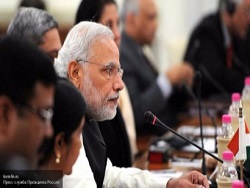
Prime Minister Narendra modi doubles down on India’s macroeconomic stability, says Bloomberg.
Modi said that India has never devalued its currency to achieve growth targets and will not resort to monetary handouts as a way of increasing profits for farmers.
The head of the International monetary Fund Christine Lagarde was on the stage next to modi when he said that India “has never tried to profit in trading at the expense of its partners”. He solemnly declared that India will be a “good Asian man and an exemplary citizen of the global economic system”, welcoming the efforts to reduce inflation, modest fiscal deficit and increase foreign exchange reserves.
“Against the background of the global challenges I am pleased to note that India is a haven of macroeconomic stability and a beacon of hope of economic dynamics and opportunities,” said modi on Saturday at a conference in new Delhi. – We do not pursue beggar-thy-neighbor”.
Comments modi reaffirm their commitment to the obligations assumed in last month representatives on Finance of the Big twenty to stimulate growth to avoid competitive devaluations. Steep losses in global stock markets and the volatility of the currencies in the beginning of the year has led to calls largest world economies to take action to support demand and to foster stability.
Modi also assured investors that his government remains committed to the control of rising prices, said that the budget reflected an increase of farmers ‘ income in half. The focus is on rural areas, where 70% of India’s population. This question is raised because modi faces several key state elections, which could affect its economic program.
“Our assistance to farmers is not charity,” said modi. He plans to increase revenue through measures such as investing in irrigation systems, increasing productivity, improving distribution of food and creation of assets of the agricultural lands.
“Our recent installation of the state budget covers the roadmap of our future plans and ambitions,” said modi. Our main philosophy is clear – to create conditions for receiving large profits, and must be extended to all residents of India, especially the poor, vulnerable farmers and marginalized communities.”








